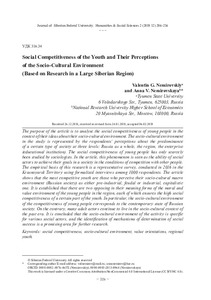Social Competitiveness of the Youth and Their Perceptions of the Socio-Cultural Environment (Based on Research in a Large Siberian Region)
Скачать файл:
URI (для ссылок/цитирований):
https://elib.sfu-kras.ru/handle/2311/109548Автор:
Nemirovskiy, Valentin G.
Nemirovskaya, Anna V.
Немировский, В.Г.
Немировская, А.В.
Дата:
2019-02Журнал:
Журнал Сибирского федерального университета. Гуманитарные науки. Journal of Siberian Federal University. Humanities & Social Sciences;2019 12 (2)Аннотация:
The purpose of the article is to analyse the social competitiveness of young people in the context of their ideas about their socio-cultural environment. The socio-cultural environment in the study is represented by the respondents’ perceptions about the predominance of a certain type of society at three levels: Russia as a whole, the region, the enterprise (educational institution). The social competitiveness of young people has only scarcely been studied by sociologists. In the article, this phenomenon is seen as the ability of social actors to achieve their goals in a society in the conditions of competition with other people. The empirical basis of this research is a representative survey, conducted in 2016 in the Krasnoyarsk Territory using formalized interviews among 1000 respondents. The article shows that the most competitive youth are those who perceive their socio-cultural macro environment (Russian society) as either pre-industrial, feudal or industrial, capitalistic one. It is established that there are two opposing in their meaning forms of the moral and value environment of the young people in the region, each of which ensures the high social competitiveness of a certain part of the youth. In particular, the socio-cultural environment of the competitiveness of young people corresponds to the contemporary state of Russian society. On the contrary, many adult actors continue to live in the socio-cultural context of the past era. It is concluded that the socio-cultural environment of the activity is specific for various social actors, and the identification of mechanisms of determination of social success is a promising area for further research Цель статьи состоит в анализе социальной конкурентоспособности молодежи в контексте ее представлений о своей социокультурной среде. Социокультурная среда в исследовании репрезентирована представлениями респондентов о преобладании определенного типа общества на трех уровнях: Россия в целом, регион, предприятие (учебное
заведение). Социальная конкурентоспособность молодежи практически не изучена
отечественными социологами. Данный феномен в статье трактуется как способность социального актора к достижению своих целей в обществе в условиях соперничества с другими. Эмпирической базой выступает исследование, проведенное в 2016 г.
в Красноярском крае по репрезентативной выборке методом формализованного интервью среди 1000 респондентов. В статье показано, что наиболее конкурентоспособна та молодежь, которая воспринимает свою социокультурную макросреду (российское общество в целом) как доиндустриальное, феодальное или индустриальное, капиталистическое. Авторы делают предположение, что социокультурная среда
конкурентоспособности молодежи максимально соответствует современному состоянию российского общества, что влечет за собой вывод о специфичности социокультурной среды деятельности различных социальных акторов и перспективности
ее дальнейшего исследования для выявления малоизученных механизмов детерминации
их социальной успешности

